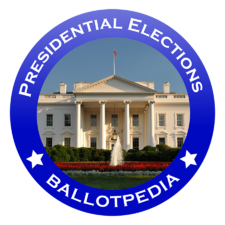Topics and participation in the CBS Republican debate (February 2016)
Ballotpedia's scope changes periodically, and this article type is no longer actively created or maintained. If you would like to help our coverage grow, consider donating to Ballotpedia.
Ballotpedia's scope changes periodically, and this article type is no longer actively created or maintained. If you would like to help our coverage grow, consider donating to Ballotpedia.
Date: November 8, 2016 |
Winner: Donald Trump (R) Hillary Clinton (D) • Jill Stein (G) • Gary Johnson (L) • Vice presidential candidates |
Important dates • Nominating process • Ballotpedia's 2016 Battleground Poll • Polls • Debates • Presidential election by state • Ratings and scorecards |
2028 • 2024 • 2020 • 2016 Have you subscribed yet?
Join the hundreds of thousands of readers trusting Ballotpedia to keep them up to date with the latest political news. Sign up for the Daily Brew.
|
This article analyzes the central themes of the Republican presidential debate held on February 13, 2016, in Greenville, South Carolina. The transcript prepared by The Washington Post was used to measure candidate participation and audience engagement.[1] Footage from the debate was consulted where there were ambiguities in the text.
To compare the statistics of this debate to those of the previous Republican debate, see the analysis of the Topics and participation in the ABC Republican debate (February 2016).
Segments
Including closing statements, the ninth Republican presidential debate featured 19 unique discussion segments covering the Supreme Court vacancy, economic growth, domestic policy and conservative politics. These discussion segments were measured by any shift in the theme of a discussion prompted by one of the moderators: John Dickerson, Major Garrett and Kimberley Strassel.
- The death of Justice Antonin Scalia and the Supreme Court vacancy
- Preparation for a national security crisis
- Russia, Syria and ISIS
- The Iraq War and former President George W. Bush
- Civilian casualties
- Cost of federal assistance programs
- Tax reform
- Medicaid
- Economic growth through taxation
- Immigration reform
- Poverty
- Executive authority
- Conservative principles and politics
- Political correctness
- John Kasich's Democratic appeal
- Donald Trump's advisers and conduct
- Political compromise and the Republican Party
- Advice from former presidents
- Closing statements
Overall participation
Participation in a discussion segment was defined as a substantive comment related to the discussion segment's topic. Jokes and attempts to gain permission from a moderator to speak were not considered participatory speech acts. In some instances, candidates who participated in a discussion segment diverted from the prompted topic.
The median number of discussion segments was eight. Donald Trump participated in the most discussion segments at 11. Ted Cruz and John Kasich each contributed to seven discussion segments.
Candidate participation by behavior
Participation in the debate was also measured by the candidate's behavior at the start of each discussion segment. This study considered whether a candidate was initially prompted by a moderator to speak during a discussion segment or whether he or she independently engaged in the discussion segment by interrupting another candidate or calling on the moderator for permission to speak. A candidate's conduct after they joined a discussion segment was not considered.
Only Bush and Trump interjected themselves into a discussion segment. This was the fewest number of interjections in any Republican presidential debate during the 2016 election cycle.
Candidate participation by speaking time
According to speaking time estimates from NPR, Trump spoke the longest, registering almost 16 minutes on the clock. With 10.6 minutes of speaking time, Rubio spoke significantly less than his record 18.2 minutes during the last Republican debate.[2]
Consistent with the three previous debates, Carson spoke for the least amount of time.
Candidate participation by speaking rate
Each candidate's speaking rate was calculated by dividing the total word count of the candidate's speech during the debate with his speaking time as measured by NPR. Consistent with previous debates, Rubio spoke at the quickest rate.
Candidate participation by segment vs. speaking time
The amount of time a candidate spoke did not necessarily align with the number of issues he covered during the debate.
Although Cruz spoke longer than all but Trump, he participated in the fewest number of discussion segments.
Audience engagement
Audience engagement was measured by noting applause, cheering, or laughter in The Washington Post's transcript. Footage from the debate was consulted when the text was ambiguous about to whom the audience was responding.
For the second Republican presidential primary debate in a row, Bush received the strongest response from the live audience with 18 instances of positive audience engagement. Rubio and Trump followed with 16 instances and 11 instances, respectively.
The discussion segment on immigration reform produced the most audience engagement overall.
Candidate analysis
|
|
|
|
|
|
See also
- Presidential candidates, 2016
- Presidential election, 2016/Polls
- 2016 presidential candidate ratings and scorecards
- Presidential election, 2016/Straw polls
Footnotes
| |||||||||||













